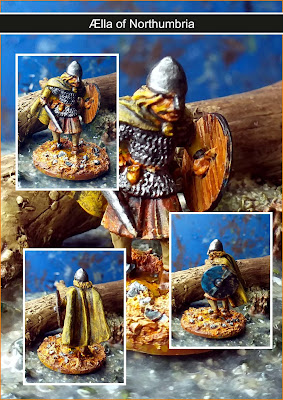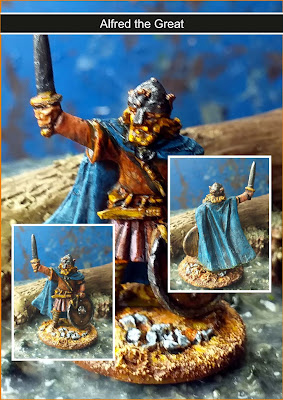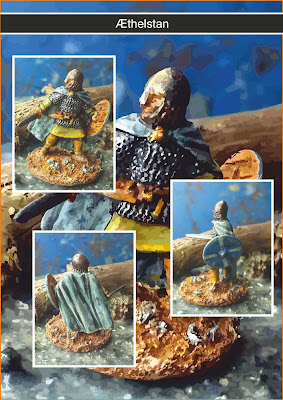Ælla of Northumbria
Ælla (or Ælle or Aelle) (fl. 866; died 21 March 867) was King of Northumbria, a kingdom in medieval England, during the middle of the 9th century. Sources on Northumbrian history in this period are limited, and so Ælla's ancestry is not known and the dating of the beginning of his reign is questionable.
In addition to the Anglo-Saxon Chronicle, Ælla is also mentioned in Scandinavian sources, such as the Norse sagas. According to the latter, Ælla captured the semi-legendary Swedish-Danish Viking leader Ragnar Lodbrok and put him to death in a pit of snakes. The historical invasion of Northumbria in 866 occurred in retaliation for Ragnar's execution, according to Ragnarssona þáttr (The Tale of Ragnar's Sons). While Norse sources claim that Ragnar's sons tortured Ælla to death by the method of the blood eagle, Anglo-Saxon accounts maintain that he died in battle at York on 21 March 867. Concerning the Norse claim, Roberta Frank reviewed the historical evidence for the ritual in her Viking Atrocity and Skaldic Verse: The Rite of the Blood-Eagle, where she writes: "By the beginning of the nineteenth century, the various saga motifs—eagle sketch, rib division, lung surgery, and 'saline stimulant'—were combined in inventive sequences designed for maximum horror." She concludes that the authors of the sagas misunderstood alliterative kennings that alluded to leaving one's foes face down on the battlefield, their backs torn as carrion by scavenging birds. If this is to be believed, then it is easy to surmise that the mention of his death via the blood eagle, is in fact a description of his death on the battlefield, which would make both accounts of his death true...
https://en.wikipedia.org/wiki/%C3%86lla_of_Northumbria
Alfred the Great
Alfred the Great (Old English: Ælfrēd,[b] Ælfrǣd,[c] 'Elf-counsel' or 'Wise-elf'; between 847 and 849 – 26 October 899) was King of Wessex from 871 to c. 886 and King of the Anglo-Saxons from c. 886 to 899. He was the youngest son of King Æthelwulf of Wessex. His father died when he was young and three of Alfred's brothers, Æthelbald, Æthelberht and Æthelred, reigned in turn before him.
After ascending the throne, Alfred spent several years fighting Viking invasions. He won a decisive victory in the Battle of Edington in 878 and made an agreement with the Vikings, creating what was known as the Danelaw in the North of England. Alfred also oversaw the conversion of Viking leader Guthrum to Christianity. He defended his kingdom against the Viking attempt at conquest, becoming the dominant ruler in England. Details of his life are described in a work by 9th-century Welsh scholar and bishop Asser.
Alfred had a reputation as a learned and merciful man of a gracious and level-headed nature who encouraged education, proposing that primary education be conducted in Anglo-Saxon rather than Latin and improving the legal system and military structure and his people's quality of life. He was given the epithet "the Great" during and after the Reformation in the sixteenth century, and, alongside the Danish Cnut the Great, remains the only king of England to be given such a name...
https://en.wikipedia.org/wiki/Alfred_the_Great
--------------------------------------------------------------------------------
Æthelstan
Æthelstan or Athelstan (/ˈæθəlstæn/; Old English: Æþelstan[a] or Æðelstān;[b] Old Norse: Aðalsteinn meaning "noble stone"; c. 894 – 27 October 939) was King of the Anglo-Saxons from 924 to 927 and King of the English from 927 to 939 when he died.[c] He was the son of King Edward the Elder and his first wife, Ecgwynn. Modern historians regard him as the first King of England and one of the greatest Anglo-Saxon kings. He never married and had no children. He was succeeded by his half-brother, Edmund.
When Edward died in July 924, Æthelstan was accepted by the Mercians as king. His half-brother Ælfweard may have been recognised as king in Wessex, but died within three weeks of their father's death. Æthelstan encountered resistance in Wessex for several months, and was not crowned until September 925. In 927 he conquered the last remaining Viking kingdom, York, making him the first Anglo-Saxon ruler of the whole of England. In 934 he invaded Scotland and forced Constantine II to submit to him, but Æthelstan's rule was resented by the Scots and Vikings, and in 937 they invaded England. Æthelstan defeated them at the Battle of Brunanburh, a victory which gave him great prestige both in the British Isles and on the Continent. After his death in 939 the Vikings seized back control of York, and it was not finally reconquered until 954.
Æthelstan centralised government; he increased control over the production of charters and summoned leading figures from distant areas to his councils. These meetings were also attended by rulers from outside his territory, especially Welsh kings, who thus acknowledged his overlordship. More legal texts survive from his reign than from any other 10th-century English king. They show his concern about widespread robberies, and the threat they posed to social order. His legal reforms built on those of his grandfather, Alfred the Great. Æthelstan was one of the most pious West Saxon kings, and was known for collecting relics and founding churches. His household was the centre of English learning during his reign, and it laid the foundation for the Benedictine monastic reform later in the century. No other West Saxon king played as important a role in European politics as Æthelstan, and he arranged the marriages of several of his sisters to continental rulers...
https://en.wikipedia.org/wiki/%C3%86thelstan




Nema komentara:
Objavi komentar